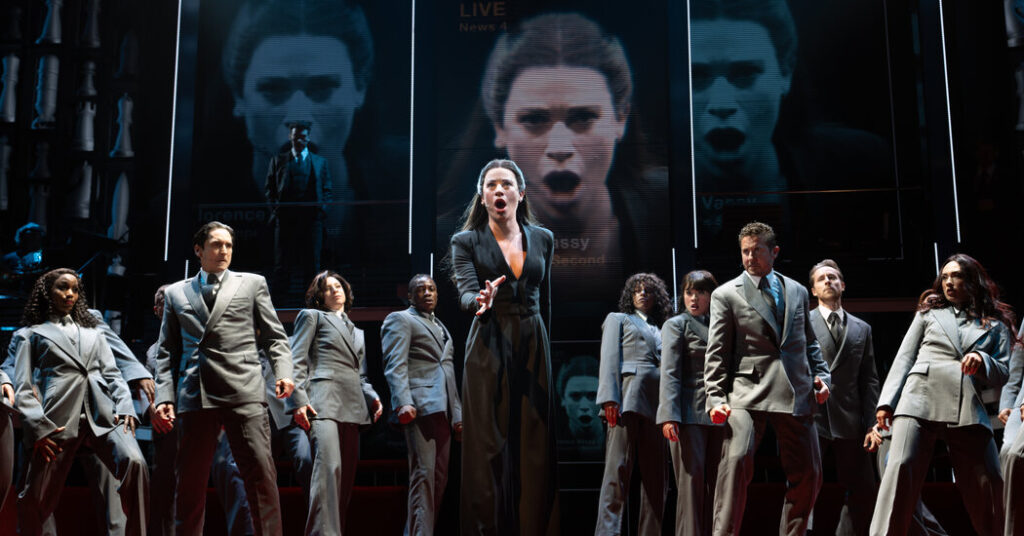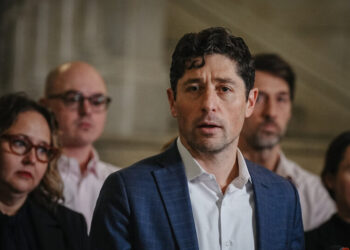The musical “Chess” is known for its brilliant score by the Abba songwriters Benny Andersson and Bjorn Ulvaeus and the “Evita” and “Jesus Christ Superstar” lyricist Tim Rice. And it is notorious for a terminally clunky story line that has undergone several alterations over the past 40 years.
Despite many a writer’s efforts, “Chess” has defeated some of the best minds in the business. But really, who can figure out a tuner born out of a 1980s concept album about competitive chess and the rivalry between the United States and the Soviet Union?
We now have an answer to one of the fall theater season’s biggest questions: Has the yearslong collaboration between the director Michael Mayer and the screenwriter Danny Strong (“Empire”) that opened Sunday at the Imperial Theater finally found the winning move? Let’s call it a draw.
Parts of the show are absolutely thrilling and parts are flat at best, aggressively dumb at worst. At least Mayer’s production, starring Nicholas Christopher, Lea Michele and Aaron Tveit, is not a bland bore. Thinking back to Michele’s big, then bigger, then biggest “Nobody’s Side” or Christopher’s red-hot, neck-vein-bursting “Anthem,” I can feel the needle move toward the positive side of the dial.
Like many previous attempts at injecting coherence into “Chess” — whose original Broadway run, in 1988, lasted only about two months after a protracted reworking following its West End premiere — the production is using a revised book. Without going into a close reading, let’s just say that Strong’s most notable change is to boost the character of the Arbiter (Bryce Pinkham) from a chess judge into an omnipresent narrator.
As the Arbiter tells us over and over, we are watching a “Cold War musical.” When it begins, in 1979, the opposing factions are represented by the Soviet chess grandmaster Anatoly Sergievsky (Christopher, in a star-making performance) and his American foe, Freddie Trumper (Tveit). In the middle is Florence Vassy (Michele), a chess genius originally from Hungary who is Freddie’s lover and second, but falls hard for Anatoly’s stern-sexy ways.
Strong’s book (an iteration of which ran at the Kennedy Center in 2018) is far from smooth. As delineated by C.I.A. and K.G.B. operatives (Sean Allan Krill and Bradley Dean), the stakes keep changing so it’s hard to track why a player must win, throw a match or forfeit. Freddie is all in only to succumb to his demons, lose Florence and give up the game altogether. We return from intermission to find him, four years later, working as a commentator, thus depriving the story of a chess face-off. In its place, we get the love triangle between him, Florence and Anatoly — with Anatoly’s estranged wife, Svetlana (Hannah Cruz), entering the scene for extra drama.
Now, about the hotheaded Yank … “Yes, I know his name is ‘Trumper’ but remember this show was originally written in 1984,” the Arbiter explains to the audience. Most of these asides are not funny, with jokes about Joseph Biden and Robert Kennedy Jr. that would mortify a third-rate comedian. The snarky sensibility is most egregious when the character switches back to his original function for his big number, “The Arbiter” — “which yes, means I’m going to sing. And yes, I’m going to crush it,” he says. He then proceeds to make fun of the song while performing it, down to a sarcastic air-guitar solo.
It’s a cheap shot, and it is misguided: The music is the reason “Chess” has endured all these years. The songs perfectly illustrate Andersson and Ulvaeus’s melodic wizardry, their command of a vernacular that dips into folk, operetta and rock. (“Mamma Mia!” may be known as the Abba musical because it recycles the group’s hits, yet the label fits “Chess” just as well.)
“Quartet (A Model of Decorum and Tranquility),” for example, is essentially a minuet that could have played at a royal court, the music illustrating the ruthless jostling for dominance behind the appearance of propriety. The ballad “Heaven Help My Heart” is on par with Abba’s finest offerings in that style and Michele does it justice, while “I Know Him So Well” — a duet between Florence and Svetlana — is pop heaven.
The score’s strength is the reason “Chess” is very effective when done in concert — a semi-staged performance, in 2003, with Josh Groban, Raúl Esparza, Julia Murney, Adam Pascal and Sutton Foster, remains one of the most electric live experiences of my life. Some of Mayer’s production signals in that direction, with the orchestra visibly positioned on an archlike structure — David Rockwell’s relatively unadorned multitiered set an assemblage of 1980s-style clean lines, chrome and neon.
The show stumbles when it tries to go flashy, as in a crass staging of “One Night in Bangkok” for which the ensemble strips to their underwear — just the women, mind you, because the men get to keep their pants. It’s either too much or not enough.
For the most part, though, Mayer is relatively economical, both in his use of video (designed by Peter Nigrini) and his deployment of movement (the choreography is by Lorin Latarro). Notably, Florence and Svetlana tend to park and bark for their bring-down-the-house numbers. Of course, the outpouring of emotion by a diva claiming center stage is a classic move, but here it also visualizes the limits put on these women. They are reacting rather than acting, as if lacking agency — which is ironic because in chess the queen is the piece with the most autonomy and power.
As for the book’s flaws, some actors deal with it better than others. Cruz makes Svetlana’s motivations enticingly cryptic: It’s unclear if she is trying to win Anatoly back solely to obey the K.G.B. or if she’s still in love with him, despite her claim to the contrary. Michele, Christopher and Tveit are good in their individual numbers — especially Christopher, whose Anatoly reveals turmoil and humor behind his severe demeanor — and rise to the vocal challenges, but oddly they don’t have much chemistry with each other. If we can’t fully feel the powerful love between Anatoly and Florence, then little makes sense.
But each time you start wondering why so-and-so is doing this or that, another great song comes along. Whether this betrays the very essence of musical theater, where ideally narrative and music go hand in hand, is an existential question. For me, the answer can always wait another day, another production of this most erratic and most ridiculously rewarding show.
Chess
Through May 3 at Imperial Theater, Manhattan; chessbroadway.com. Running time: 2 hours 45 minutes.
Sara Krulwich has been The Times’s theater photographer since 1995, photographing stage productions in New York. She joined The Times in 1979.
The post ‘Chess’ Review: At Least They Have the Music appeared first on New York Times.




